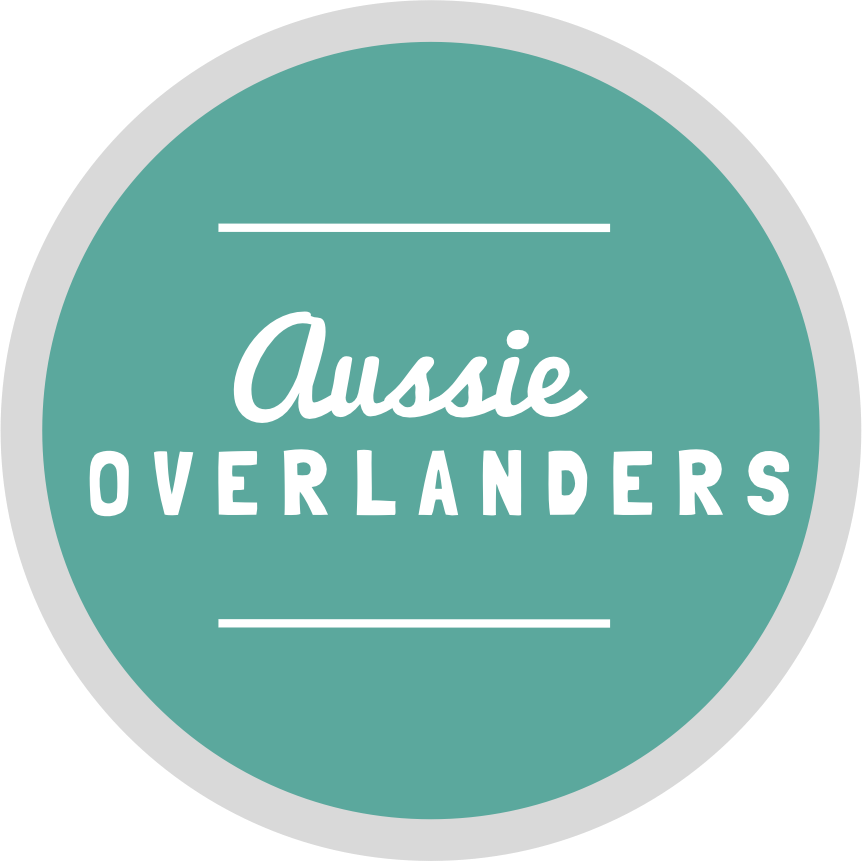South Africa
ROBBEN ISLAND
Robben Island was a tour that I had wanted to experience for a long time. I missed out last time we were in South Africa due to bad weather. This time I made sure we visited this World Heritage listed site.
When you read any South African guide book or Google “Things to do in South Africa”, Robben Island will always be mentioned. It is a place of national importance and infamously known as the place where Nelson Mandela was held for most of his 27 years as a political prisoner.
I was hoping to gain an insight into the past history of the Island. I was hoping to be emotionally moved by being there. I was hoping to see some post apartheid artefacts or tools used by the former prisoners. I was also hoping to gain an understanding of its importance to the South African people. I got little of that.
The tour consisted of two parts. A bus ride around some parts of the Island and a walking tour with an ex-prisoner.
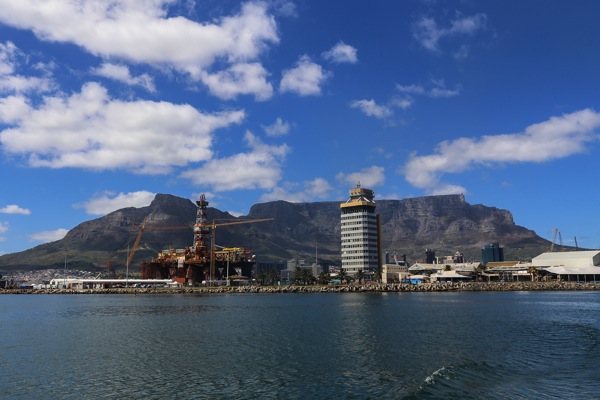
^ Sailing off from the waterfront
The tour began with a 45 minute ferry ride across to the island from the waterfront in Cape Town. We were on the old ex-prisoner ferry named Dias which made a nice cruise across to the island, spotting seals and dolphins riding the bow waves. Once there, us and a hundred or so others jumped onto the awaiting buses and were driven around the island for 40 or so minutes. The tour guide on the bus was nice. He tried to create a sense of belonging by asking us our nationalities. Part of his repertoire was to knock the Germans and Dutch for their past history in South Africa. He also went on to say if there were any Aussie’s on the bus “we would each be leaving with one of the trees that were introduced onto the island and native to Australia”.
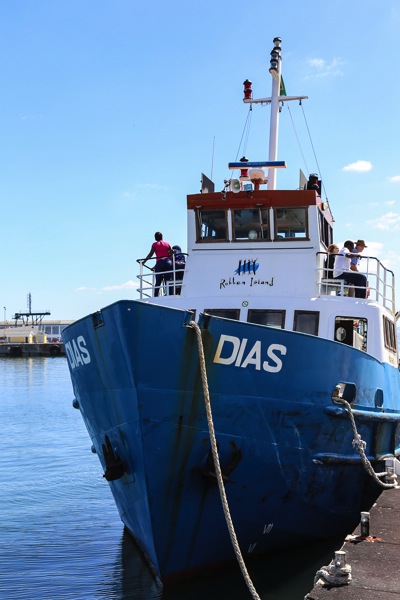
^ The ferry which took us over to Robben Island
The bus then quickly sped off to our first stop at the small house of ex-prisoner Robert Sobukwe. Our guide explained to us the significance of Sobukwe and how he started the Pan Africanist Congress. We were then quickly hustled into have a look around the former prisoners place of detention. There were notes and letters placed on the walls – presumably from Sobukwe but we were unable in the time allocated to read any of them. We were then ushered back onto the bus and as the bus started to speed off someone yelled out that people were missing. We stopped and as the stragglers caught up we again started to speed off to the next destination.
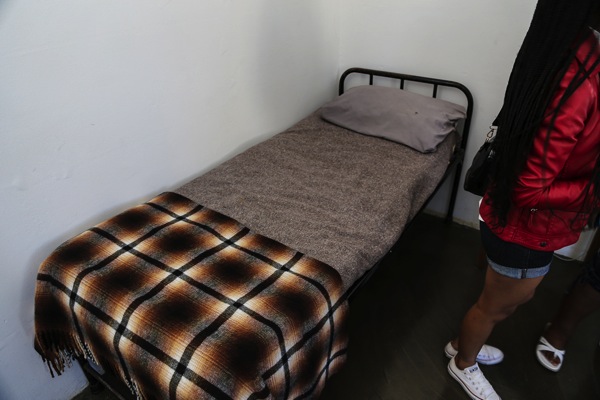
^ Robert Sobukwe’s bed in his small house like cell
At the next stop we had a magnificent view of Table Mountain and the sprawling city of Cape Town. Just beautiful. All people back on the bus and our guide started his next little story of how George Bush didn’t find any weapons of mass destruction in Iraq. We wandered where this story was going, but then we pulled up to a ginormous cannon. I don’t know the reason for it being there other than the guides comedy routine “it was to defend South Africa from invasion by the U.S. looking for weapons of mass destruction”. Our guide joked about this and threatened that South Africa was safe because of this gun. I wish I could show you the size of it but we did not have the time to get the bus and I wasn’t able to get a clear picture.
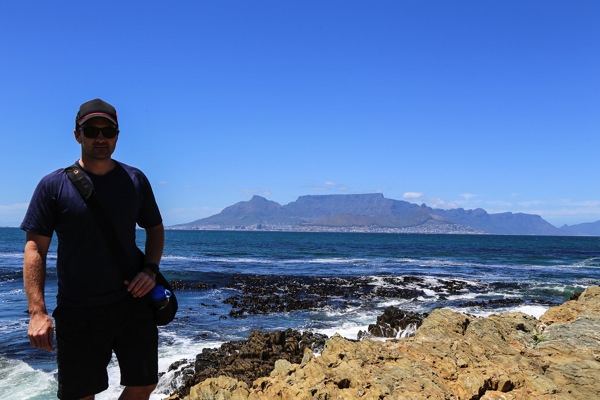
^ Views across to Cape Town
The bus soon accelerated off from the big gun and made its way up to the limestone quarry where the ex-prisoners were forced to work under appalling conditions. We were told that this was the place where the late Nelson Mandela had been forced to work and it was also the place where he first contracted his lung condition. The guide waffled on, eventually deciding that Nelson Mandela died as a result of a lung condition he obtained from working “on this god forsaken island”. We couldn’t help but think that at 94-years old he possibly died of many things including old age. Again we were not allowed off to wander around. Time didn’t permit so I can’t explain to you how it felt standing in the quarry and I didn’t get any real facts to share with you. Perhaps some of the time spent listening to this guy telling bad jokes could have been reallocated to visitors actually experiencing the island.
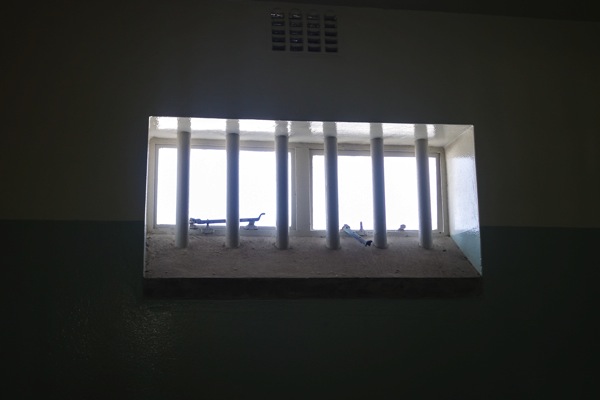
^No chance of escape here
Our final stop was at the prison where our bus guide told us we would be meeting up with an ex-political prisoner. The bus tour ended with the guide telling us that he is always asked about the “customs of tipping and gratuities… It is not customary to tip if you don’t wish to. We will leave it up to your own discretion”. I thought this was funny because IF the bus tour was informative I would have tipped him. All I found out was that they have a big gun on the island where former prisoner Sobukwe was kept and the island is full of trees introduced from Australia. I was disappointed with the way I was left feeling. The bus guide provided very little insight and the genuine lack of information left me feeling annoyed.
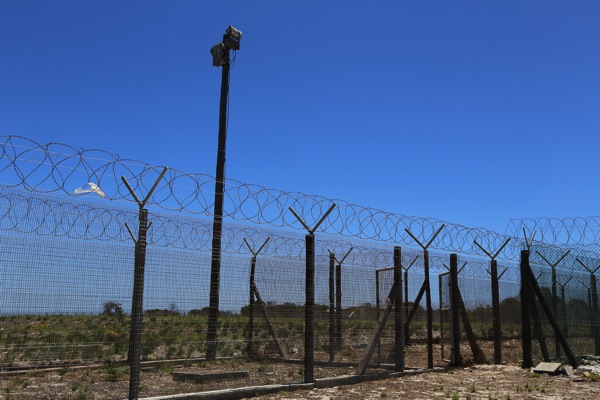
^ Double fencing
I was excited once we were off loaded from the bus to meet former political prisoner ZoZo. He was a thick powerful looking man with a distinctly deep, loud blood curdling voice. He told us why he was imprisoned. He treated us well and kept referring to the large tour group as “my guests”. We followed him around the prison section of the Island and were shown a few areas. This part of the tour was also very rushed but I did get a feeling of what it must have been like for those ex-prisoners on the island. There was a dark atmosphere inside.
The large tour group was hurried into the area where Mandela was held. We were shown his cell and all of us had a very brief chance to line up and look inside it. This was unfortunately rushed and by the time it was our turn to look inside the cell we could here our burly guides deep loud voice explaining something else outside. The cells were so tiny and the sleeping mats so thin. The prisoners were given the mats, cutlery, a bucket to use as a toilet and a small pillow. Kirsty and I both imagined Mandela in there gripping the same prison bars we were holding. Having been held 18 years of his 27 years in this very cell.
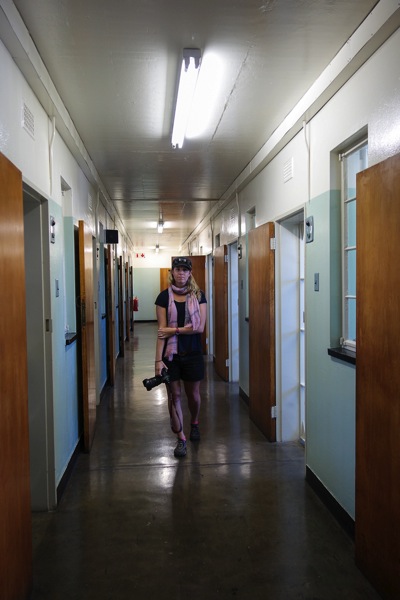
^ If these walls could talk
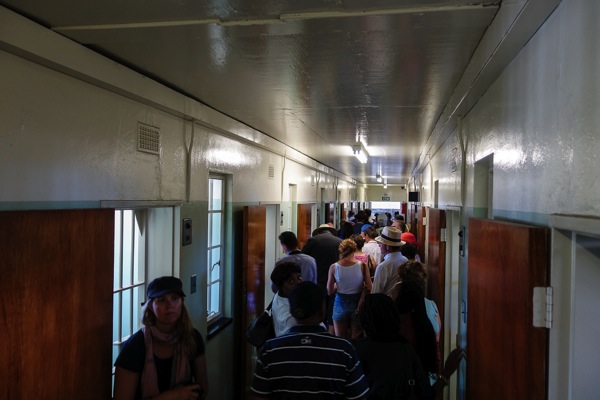
^ Lining up in our tour group to catch a glimpse of the cell where Mandela was locked up
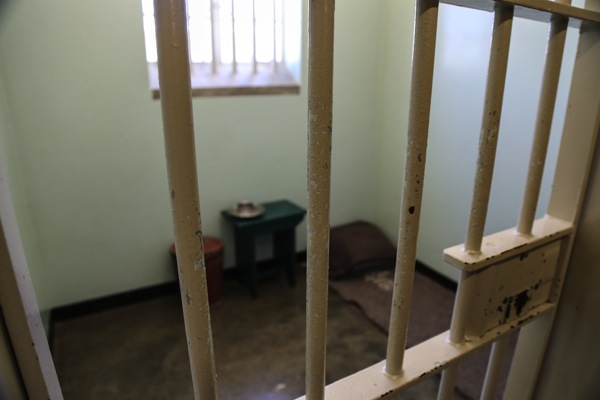
^ Nelson Mandela’s cell
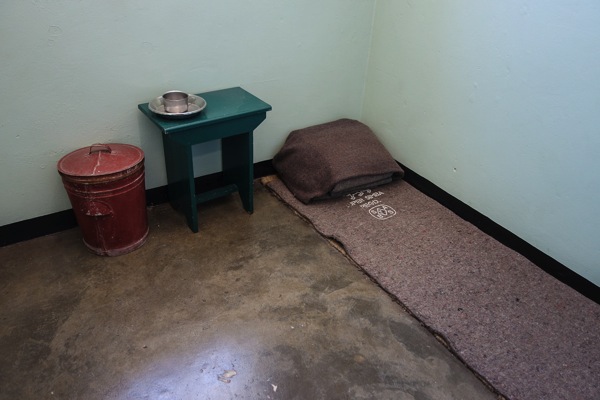
^ The “bed”, toilet and cutlery
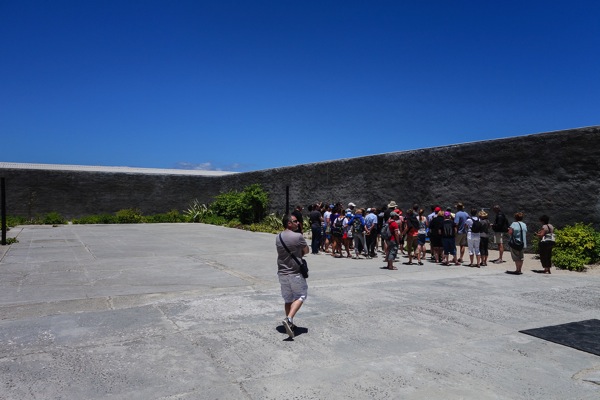
^ Catching up to the group in the courtyard
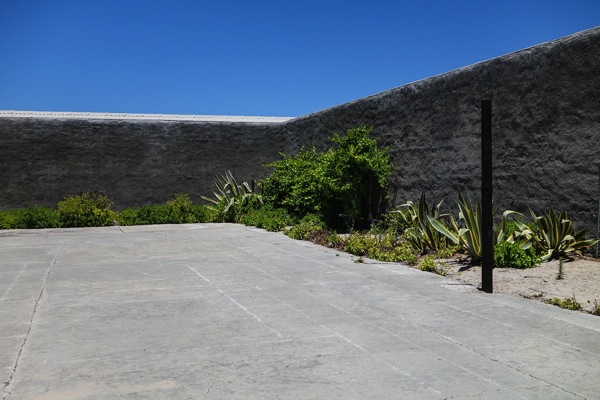
^ Nelson Mandela’s garden: “To plant a seed, watch it grow, to tend it and then harvest it, offered a simple but enduring satisfaction. The sense of being the custodian of this small patch of earth offered a small taste of freedom”
We were then shown where the current President Jacob Zuma had been imprisoned for ten years. ZoZo described how the guards would regularly beat the prisoners (himself included). He said that the blacks were made to feel sub-human. They were made to wear shorts and sandals where the Indians and coloured people got to wear long pants. The blacks had less food and of a poorer standard. On his final speech in the freshly painted cell, ZoZo began quoting Nelson Mandela. This was quite moving but I didn’t get a chance to take it in because we were all told that the tour was over and “Please my guests follow me. You can now make your long walk to freedom”.
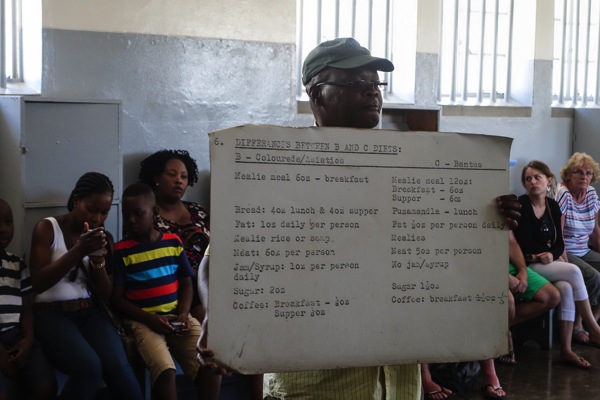
^ A description of what the prisoners were fed
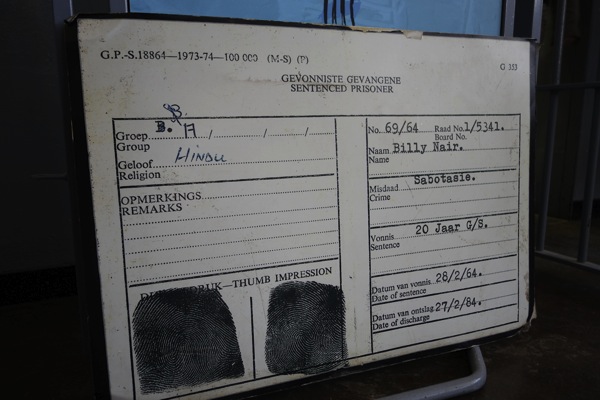
^ A prisoners i.d. card
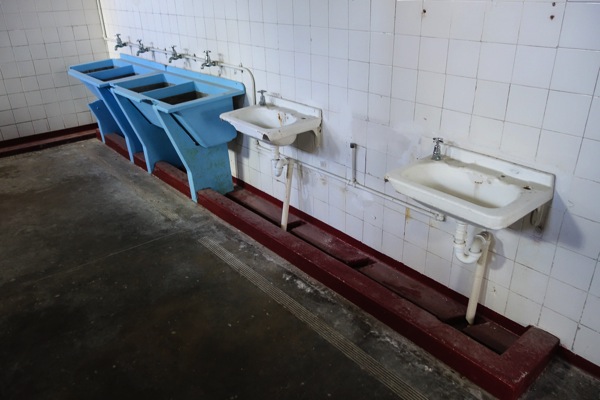
^ The wash area in ZoZo’s cell block
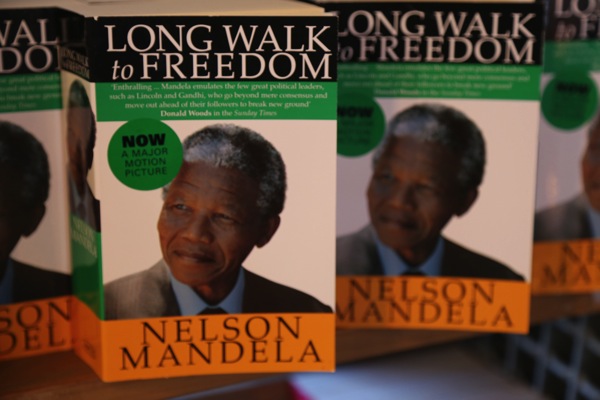
I left this tour feeling a deep sense of disappointment. That a World Heritage listed site of such historical importance can leave you feeling like that makes me think they have got something wrong. I am glad I visited Robben Island but I would have much preferred to have experienced it at a slower pace, so that I could have taken it all in, and learnt more about life here.
Cheers
![]()
